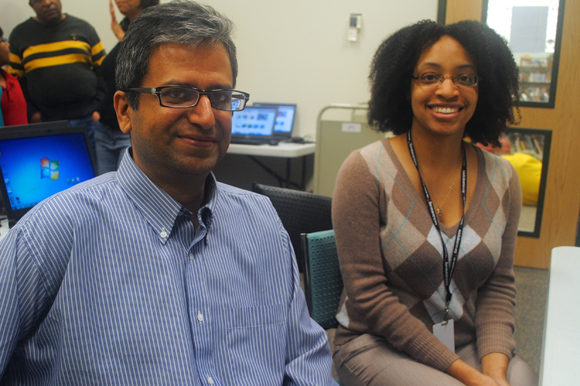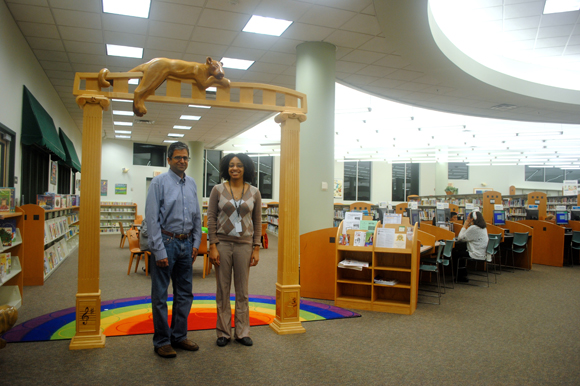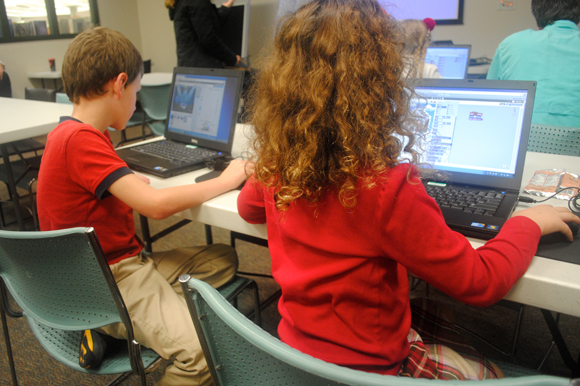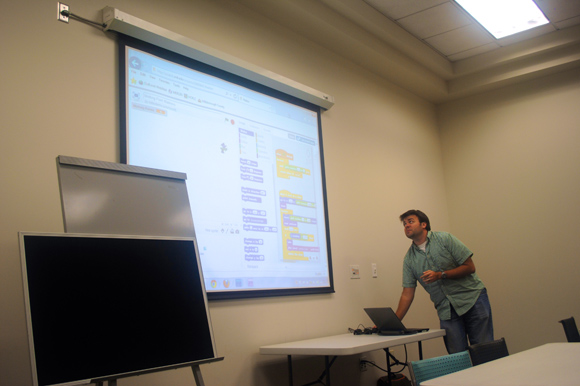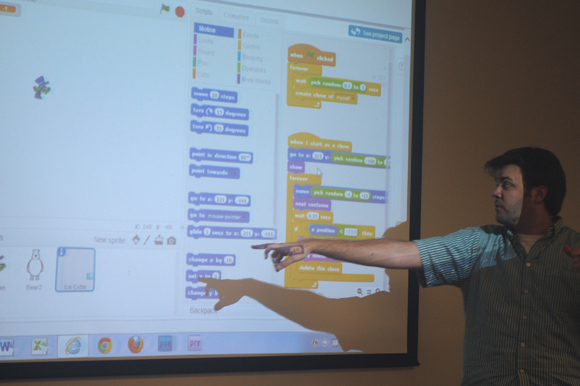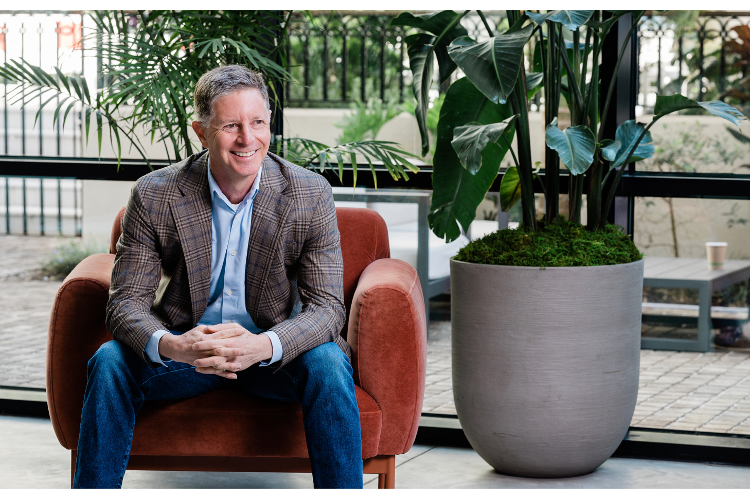CoderDojo: Teaching Next Gen Techies To Write Code
CoderDojo, a free programming class for children ages 5-17, is described on its website as an "open-source, volunteer-led movement.'' The group was founded in Dublin, Ireland, in early 2011 and spread to Tampa in May 2013, settling into two Hillsborough County locations with two more in the works.
Eleven-year-old Wade Ferris focuses on the computer screen at the Jan Platt Library in South Tampa, his hands occasionally tapping at the keys. A few feet away, his brother works at an identical laptop, while their father looks on. The brothers are completely engaged in the virtual world, but they are not playing a game. They are learning how to create one.
Every other Thursday, from 6 to 7 p.m., the boys — along with 10-20 other students and parents — learn about coding in a small meeting room at the public library.
“We’ve come about eight or nine times now,” Ferris says. “We really like it.”
1,000 Kids Coding In Tampa Bay
The boys are participating in a special computer coding class organized by Ramesh Sambasivan, a member of Tampa Bay WaVE’s Round Table. Sambasivan is no stranger to startups and technology. He moved to Tampa last year and, after seeing a TEDx Talk entitled “Let’s Teach Kids to Code,” CoderDojo Tampa Bay Area was born. Through WaVE, Sambasivan began to recruit mentors for the group.
He relates an idea that came up in a discussion with WaVE founder Linda Olson: “We need 1,000 kids coding in Tampa, and we need 1,000 mentors.”
CoderDojo, a free programming class for children ages 5-17, is described on its website as an “open-source, volunteer-led movement.” The group was founded in Dublin, Ireland, in early 2011 and spread to Tampa in May 2013, settling into two Hillsborough County locations with two more in the works.
With the aid of a free online tool called Scratch, volunteer mentors teach children how to create commands to control on-screen characters, or “sprites.”
“I really like Scratch, because it’s just the beginning of learning how to ‘real code,’ where you have to type your own things,” Ferris says. “These are just drag-and-click, but I like it because you can make anything you want. And I think it’s really cool!”
The program allows kids to learn about the broad concept of programming.
“The CoderDojo credo is ‘be cool,’ above all,” Sambasivan explains. “The whole idea is for children to get excited about programming, to learn to think like a programmer. It doesn’t focus so much on the actual syntax, but to train yourself to think logically.”
“We have a broad guideline, but we try not to teach kids directly,” says Sambasivan. “We try to stay back and step in when the child looks for help. The idea is not to stifle their creativity. And it’s worked really well — you’ll see a child helping another child out. More advanced kids often help newcomers.”
Students are welcomed into classes on a free, rolling basis. Through the use of an event-based app and firm protocols about parental involvement (a parent must both register for the class and attend with his or her child), the group has become a staple in the lives of those who attend the sessions.
“It becomes almost a family event, around the children,” Sambasivan says, “and that’s what makes it very special. Many of the parents learn along with the child.”
Adam Conway agrees. “There’s an amazing demand for people who want to do this kind of thing,” he says. Conway, a parent who has attended CoderDojo Tampa Bay Area sessions “seven or eight times,” says his children, ages 7 and 5, “love learning this stuff. It’s a little challenging for a kindergartener, but she’s starting to get it.”
Local Support From Library System
Children are comfortable at the library, says Sambasivan. In fact, a parent suggested the location. Local library staff offers support in the form of meeting space, laptops for use during sessions, technical support, set-up and breakdown of the space, and marketing.
“The support that we have from the (Jan Platt) library is like a world standard,” Sambasivan says, “and no money has changed hands. Our chapter is fueled by the passion of its volunteers.”
Alison Harris, a technical specialist at Jan Platt Library, explains, “Non-profit organizations can always use our meeting rooms at libraries across Hillsborough County, as long as they fill out an application.”
When Judy Iglesias, principal librarian for the Hillsborough County Public Library system, heard about the program’s application to use library space, she passed the idea along to chief librarian Andrew Breidenbaugh, says Harris. “He’s on the cutting edge as far as technology goes, so once he thought it was a great idea, he decided to turn it into a library program.”
CoderDojo Tampa Bay Area has brought an increased level of interaction to the library.
“To see all the kids interact with each other is great,” Harris says. “There’s a lot of collaborative learning, which we’re totally supportive of — that’s really what the library is trying to envision and promote in all of our branches.”
Meeting Demand For Mentors
Mentors are sourced from the startup community in each dojo region. Many of the CoderDojo Tampa Bay Area mentors work in technology-related fields or “have a startup company under their belts,” says Sambasivan. Mentors employ what Sambasivan refers to as the “Grandmother method of teaching.”
“Grandmothers stand back, and ask questions like, ‘What did you do that for? Can you make it do this?’ to facilitate learning,” he says.
CoderDojo Tampa Bay’s biggest challenge in 2014 is supplying enough mentors to meet the demands of an enthusiastic community. Sambasivan has employed a number of strategies locally, from speaking engagements to stand-up comedy, in an effort to spread the word about CoderDojo.
“Our biggest problem so far has been the availability of mentors. The more mentors we have, the less a time commitment we would ask from everyone,” he explains. “Even once a quarter would be helpful.”
A small core group regularly volunteers their time for sessions. Most weeks, Founding Mentor Michael Lindemuth can be found walking from desk to desk, answering questions about timers or intervals or commands, or simply viewing the work that children proudly share.
“During the sessions, we’re letting them go along with their own projects and develop their ideas,” explains Lindermuth. “At the end, they can show what they come up with and what concepts they used. We let them learn.”
So what do the children learn to do? To think through the challenges presented by code, and present their work to a group.
At one session, a student introduced “Food War I,” an animation complete with fighting fruits whose faces and voices she’d programmed to appear. Another presented a charming scene of Rudolph telling a story about Santa. She’d timed her code perfectly to allow for singing a holiday song. A third young lady shares a game she calls “kinda glitchy,” but with pride.
In this classroom, there is no wrong answer.
CoderDojo sessions are set to begin in early 2014 at Brandon Regional Library, says Sambasivan. CoderDojo also plans to expand to include sessions at the new “Community Innovation Center” in the John F Germany Library downtown, where a mentor hopes to teach Java, HTML 5, and other coding languages. Sessions at these locations will likely be held on Saturday mornings.
Free classes are currently held on alternating Thursdays at the Jan Platt Library and the New Tampa Regional Library from 6 to 7 pm.
Justine Benstead is a freelance writer who spends her days walking her dog Chloe in her South Tampa neighborhood, drinking far too much coffee, tweeting, and taking photos with her trusty Nikon. Comments? Contact 83 Degrees.

